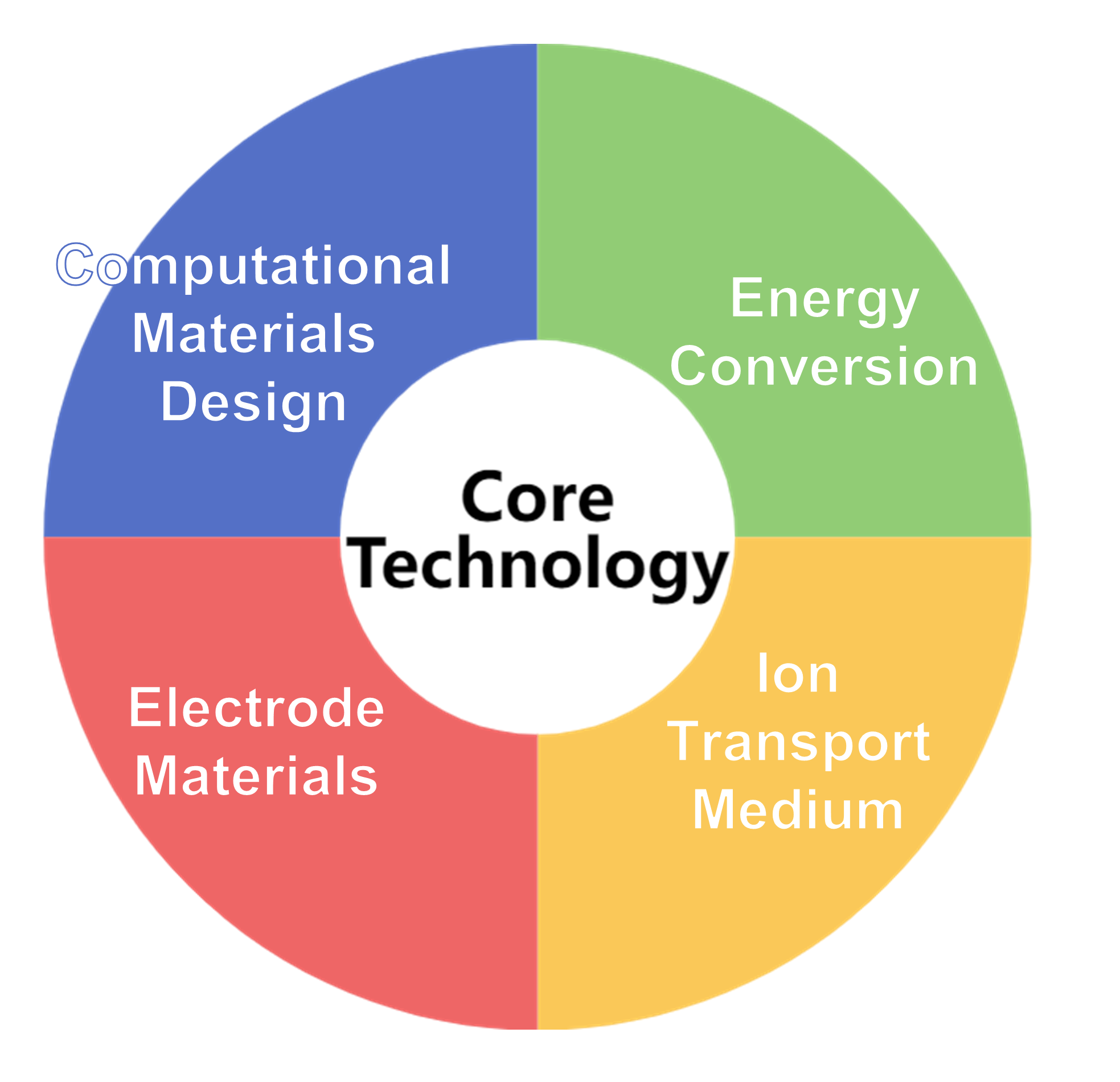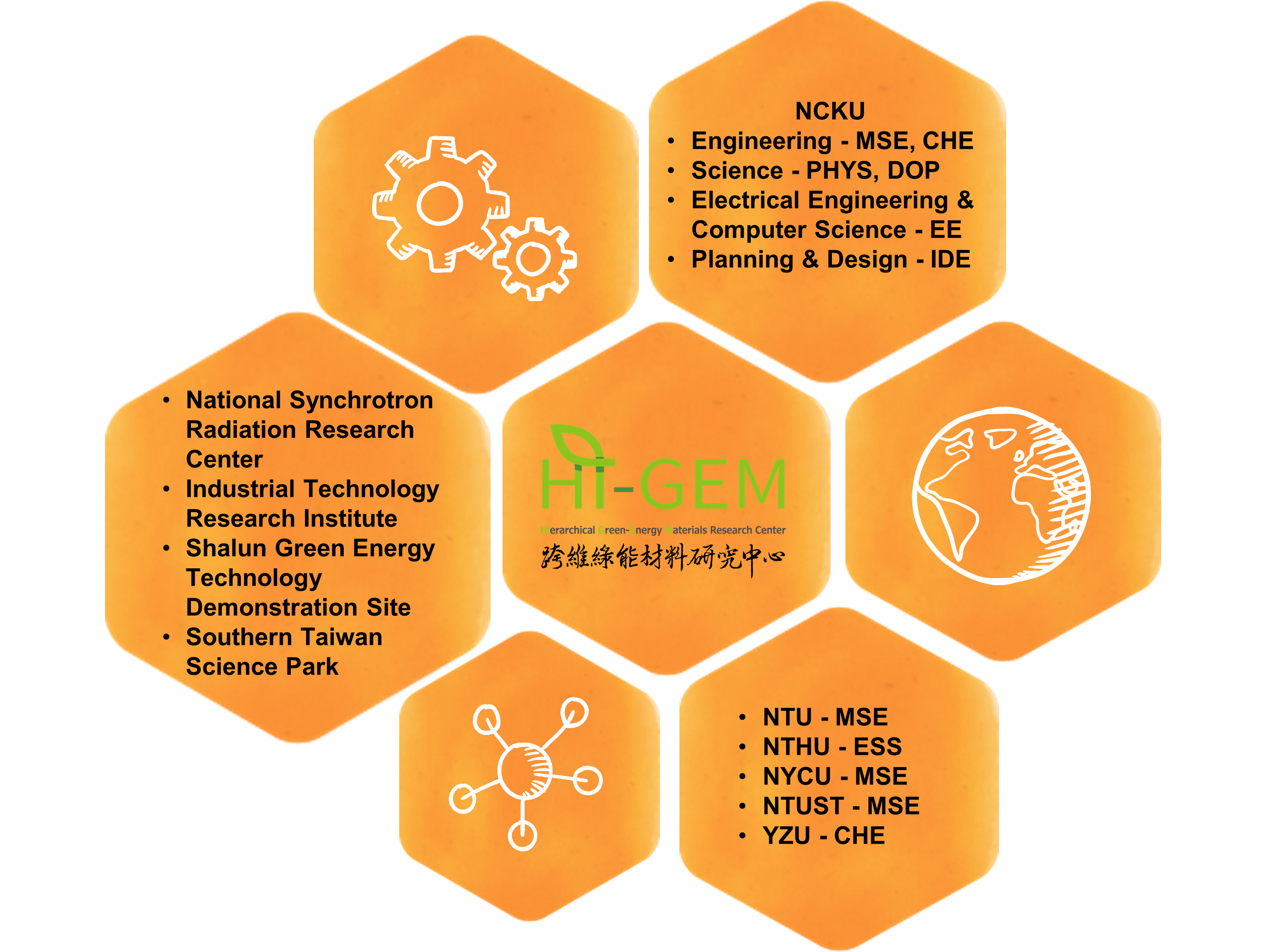【Autonomy of Key Green Energy Materials】
Hierarchical Green-Energy Materials (Hi-GEM) Research Center is one of the National Cheng Kung University (NCKU)'s school-level research centers, established since 2018 by the grants from the Ministry of Education and the Ministry of Science and Technology to fulfill the increasing demand of green materials. Our research focuses on energy storage (solid-state batteries, secondary batteries, super-capacitors) and energy conversion (solar cells, fuel cells). Hi-GEM Center aims not only to develop novel green materials but also to cultivate high-level R&D talents, strengthen international cooperation, and create industry-academic links. Hi-GEM’s breakthrough technologies include the developments of (1) high performance gel-types solid electrolytes compatible with the liquid electrolyte production line; (2) high performance silicon-carbon anode materials; (3) low-resistance nanocomposite cathode materials and high-ionic conductivity composite electrolytes for low-temperature solid oxide fuel cells; (4) the world's highest conversion efficiency printable dye-sensitized solar cells and Calcium Titanite perovskite solar cells; and (5) integrating in daily life application products.

【Green Energy Development Settlements】
Hi-GEM is a research center focusing on the development and application of green energy materials, specifically integrating domestic materials, chemical, electrical, optoelectronic, physical, industrial design and other academic majors. Hi-GEM members are mainly Integrated from seven Universities in Taiwan, namely National Cheng Kung University (NCKU), National Taiwan University (NTU), National University of Tainan (NUTN), National Tsing Hua University (NTHU), National Yang Ming Chiao Tung University (NCU), National Taiwan University of Science and Technology (NTUST), and Yuan Ze University (YZU). The center is a Cross-disciplinary linking of various departments, including Materials Science and Engineering, Chemical Engineering, Chemistry, Physics, Photonics, Electrical Engineering, Computer Science, and Planning and Design.
We have established a platform for the exchange of domestic and foreign technologies, talents, industries, and other resources through academic research, talent cultivation, international cooperation, etc., and have promoted the development of science and technology with Taiwan as a priority. International dominance and influence of Taiwan's related science and technology fields enable it to break through the technical dilemma of green energy key industries and implement results in people's livelihood and welfare, industrial technology, and links to the international community and exert its influence.
The center is expected to complete the puzzle of "Key Green Energy Materials" that Green Energy Technology lacks, and create a green energy R&D settlement in the south of Taiwan with distinctive features and international recognition. The center has a dye-sensitized solar cell core laboratory, two lithium battery test production lines, a large lithium battery laboratory set up by the Fire protection and safety research center, and the NUTN 18650 full battery assembly line to facilitate resource exchange, integration, and amplification. assembly line. Moreover, Hi-GEM has established a leading in-situ electrochemical analysis laboratory and battery assembly line in Taiwan since 2021. This will enable us to further achieve the autonomous goal of key materials for green energy in Taiwan.

【Cultivate Talents of Green Energy R&D】
Hi-GEM was established for the Ministry of Education's Higher Education Intensive Planning and Science and Technology Department's forward-looking plan and support. With cross-disciplinary thinking, it has recruited outstanding scholars from Taiwan or abroad to serve as full-time researchers to develop key green energy materials, linking Taiwan’s green energy internal and external of the school, linking the green energy industry.
Hi-GEM is located at the central region of Shalun Smart Green Energy Science City, Tainan Technology Industrial Park Service Center, Southern Taiwan Science Park Bureau of the Ministry of Science and Technology, and many leading green energy manufacturers. It is effective for cultivating high-level green energy materials R&D talents with international outlook and international mobility. The teaching will be guided by industrial issues, and the goal of “integration of teaching and research” will be achieved with graduate students participating in the industry-university cooperation plan.

Hi-GEM’s effort includes of funding and recommending outstanding doctoral and postdoctoral fellows to the top universities abroad to conduct cross-country cooperation research projects, hold international forums or workshops at the center, invite the world's top scholars to come to the center to teach short-term intensive courses, plan green energy materials industrial internship, encourage graduate students to cooperate with domestic and foreign cooperative enterprises for half a year to one year, link the green energy industry, and guide the high-level R & D talents cultivated to the cooperative enterprises. It is expected to move towards the autonomy of key green energy materials in Taiwan, and form a green energy research and development settlement with distinctive characteristics and international visibility in South Taiwan, in order to strengthen the national security foundation for Taiwan's energy diversification.

【University Social Responsibility】
In addition, Hi-GEM's goal is to closely match the international trend of the United Nations Sustainable Development Goals (SGD), in addition to the “Green Energy Technology” and “Circular Economy” programs that are highly compatible with Taiwan's 5+2 industry innovation program. For instance, target 7 (affordable and clean energy), target 8 (decent work and economic growth), Target 11 (sustainable cities (sustainable cities and communities) and target 13 Climate Action, etc., in which Hi-GEM expects to achieve reliable and sustainable green energy, in response to climate change, and promoting sustainable industrial development and productive industries. This will enhance the national talent competitiveness and strengthen the partnership between Taiwan and other countries around the world.
